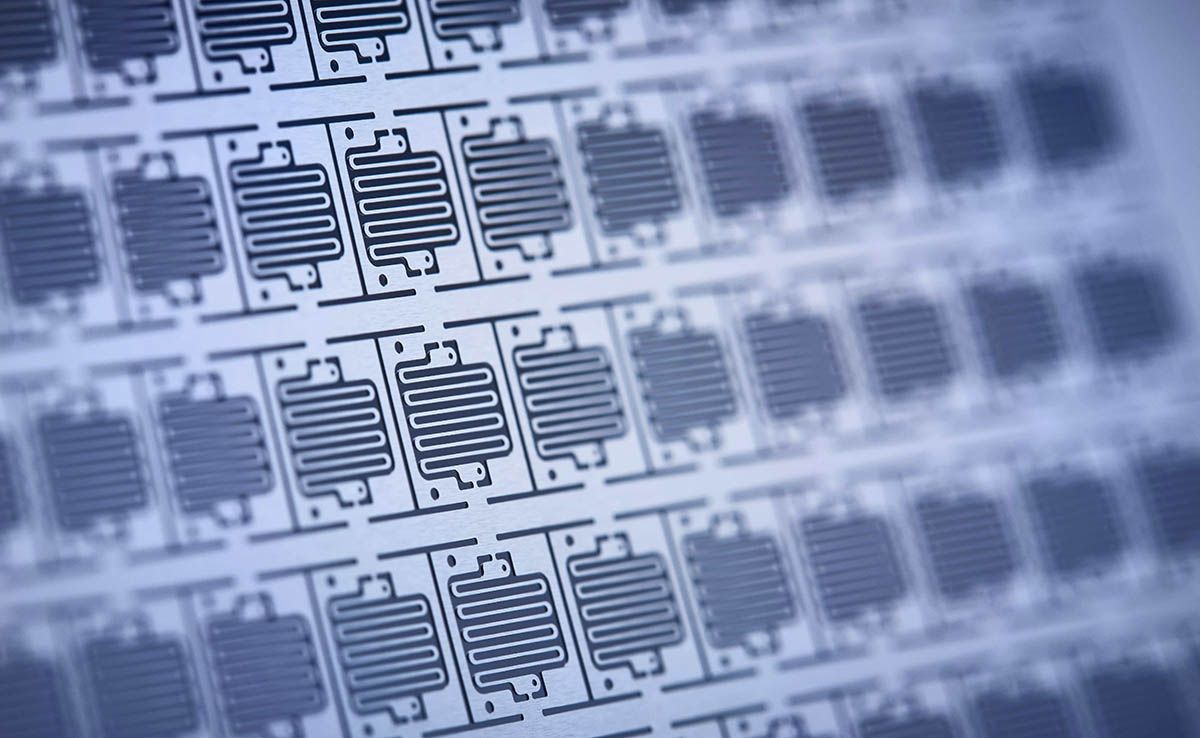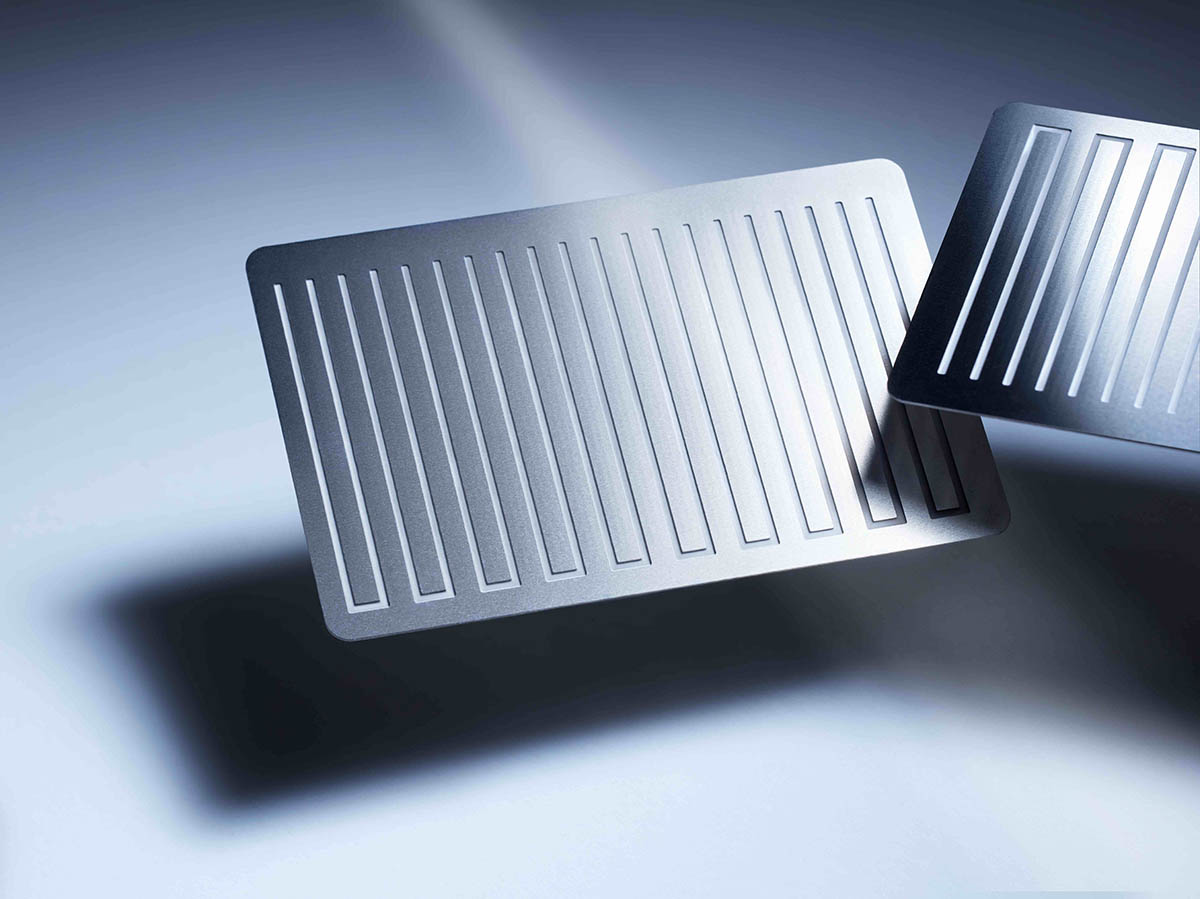Enhancing Electric Vehicle Batteries With Photo-Chemical Etching

By Jochen Kern, Head of Sales & Marketing, micrometal GmbH
Photo-chemical etching (PCE) is revolutionizing the manufacturing of components for electric vehicle (EV) batteries, significantly improving their connectivity and thermal management. The precise nature of PCE allows for the production of intricate metal parts that are essential for the efficiency and performance of modern EV batteries. This technology not only enhances the connectivity within the battery systems but also plays a crucial role in managing the thermal conditions, ensuring optimal performance and safety.

Battery connectivity in EVs is critical for efficient power distribution and overall vehicle performance. High-quality connectors ensure that electrical current flows with minimal resistance, reducing energy loss and improving the vehicle’s range. In addition, robust connections are necessary to handle the high currents involved in EV operation without overheating, which can degrade battery life and safety.
Advantages of Photo-Chemical Etching
PCE offers several key advantages for manufacturing battery components. Firstly, it can produce extremely precise and complex metal parts, which are essential for the intricate designs required in EV batteries. This precision ensures better connectivity and more efficient power distribution. Moreover, PCE can etch various metals, including copper, aluminium, and stainless steel, each offering unique benefits for battery components.
Another significant advantage of PCE is it’s stress-free manufacturing process. Unlike traditional machining or stamping, PCE does not induce stress in the metal. This results in components that retain their mechanical properties and are more reliable in demanding conditions. Additionally, PCE produces parts with burr-free edges, crucial for electrical connectivity as it ensures consistent and reliable connections. The technology is also highly scalable, making it suitable for both small-scale prototypes and large-scale production while maintaining cost efficiency.
Etching Different Types of Metal
Each type of metal used in EV batteries offers distinct advantages, and PCE enhances these benefits through its precise and controlled etching capabilities. Copper, for example, is renowned for its excellent electrical conductivity, making it an ideal material for battery connectors and busbars. PCE allows for the creation of fine, intricate copper connectors that maximise surface area and improve connectivity. Additionally, copper has superior thermal conductivity, which helps in dissipating heat generated during battery operation. PCE can create complex copper heat sinks and cooling plates that enhance thermal management.
Aluminium is another metal commonly used in EV batteries due to its weight reduction benefits. Aluminium is significantly lighter than copper, making it an attractive option for reducing the overall weight of EVs. PCE can etch thin, lightweight aluminium components that do not compromise on strength or conductivity. Aluminium’s natural oxide layer also provides corrosion resistance, essential for the longevity of battery components. PCE can produce intricate aluminium parts that maintain this protective layer, ensuring durability.
Stainless steel is also used in EV batteries for its strength and durability. It offers exceptional mechanical properties, making it suitable for structural components within the battery. PCE can etch stainless steel into complex shapes that maintain these mechanical properties. Stainless steel’s resistance to corrosion and high temperatures makes it ideal for parts exposed to harsh conditions. PCE enables the production of detailed stainless steel components that can withstand these environments. The flexibility and adaptability of PCE in handling different metals not only optimise the battery’s performance but also enhance its reliability and lifespan, crucial for advancing EV technology.
Enhancing Thermal Management
Thermal management is crucial in EV batteries to maintain performance and safety. Overheating can lead to reduced efficiency, battery degradation, and safety hazards. PCE plays a significant role in improving thermal management through various means. It can create detailed and efficient heat sinks and spreaders that enhance heat dissipation, and by maximising the surface area through intricate designs, PCE-etched components can effectively manage heat generated during battery operation.
Cooling plates are another essential component for maintaining optimal battery temperatures. PCE allows for the production of thin, lightweight cooling plates with complex channels that improve the flow of cooling fluids and enhance thermal regulation. These intricately designed cooling plates ensure efficient thermal exchange and prevent hotspots within the battery pack, which could otherwise lead to uneven wear or potential failure. The precise etching capabilities of PCE also allow for the incorporation of micro-scale features in cooling plates, further optimising their performance by facilitating better fluid dynamics and heat transfer properties.
PCE can also produce integrated thermal management solutions that combine multiple functions into a single component. This reduces the need for additional parts and simplifies the battery design, improving overall efficiency and reliability. For instance, a single PCE-manufactured component might serve as both a structural support and a thermal conductor, minimising the material usage and weight while enhancing thermal management. Such multifunctional components are particularly beneficial in the compact and densely packed environments of EV battery systems, where space is at a premium and every component must contribute to overall performance and safety.
The ability of PCE to work with various metals also enhances thermal management in EV batteries. For example, copper’s superior thermal conductivity is leveraged in PCE-etched heat sinks and cooling plates to rapidly dissipate heat. Similarly, aluminium’s lightweight nature, combined with adequate thermal conductivity, makes it an ideal choice for components where weight reduction is crucial without compromising thermal performance. The use of stainless steel, with its high-temperature tolerance and structural integrity, ensures that thermal management solutions can withstand the rigours of high-power battery operation and harsh environmental conditions.
PCE’s precision allows for the development of advanced thermal management strategies such as phase-change materials (PCMs) integration. PCE can etch containers and channels for PCMs, which absorb and release heat during phase transitions, providing a passive cooling mechanism that enhances the overall thermal stability of the battery. This integration helps in maintaining the battery’s operating temperature within optimal ranges, thus prolonging battery life and improving safety.
So the role of PCE in thermal management for EV batteries is multifaceted, encompassing the creation of highly efficient heat sinks, advanced cooling plates, and integrated multifunctional components. By leveraging the precise and flexible nature of PCE, manufacturers can significantly enhance the thermal regulation of EV batteries, leading to improved performance, safety, and longevity of the vehicle’s power source. This technological advancement is crucial as the demand for more efficient and reliable electric vehicles continues to grow, driving the evolution of battery technology to meet these needs.
Summary

The future of EV battery technology will likely see even greater integration of PCE as manufacturers seek to push the boundaries of performance and efficiency. As new materials are developed for EV batteries, PCE will be crucial in enabling their use. Advanced composites and alloys will require precise manufacturing techniques that PCE can provide. Additionally, the trend towards miniaturization in electronics and battery components will benefit from PCE’s ability to produce micro-scale parts with high precision. This will lead to more compact and efficient battery designs.
PCE is a game-changing technology for the production of EV battery components. Its ability to produce precise, complex, and stress-free parts from various metals makes it ideal for improving connectivity and thermal management in EV batteries. As the demand for efficient and reliable EVs grows, PCE will play an increasingly important role in meeting these challenges, driving innovation and enhancing the performance of next-generation electric vehicles.
About micrometal
Micrometal Group (incorporating micrometal GmbH, HP Etch and Etchform) specializes in the industrial production of highly precise metal components. The 3 companies photo-chemically etch very large numbers of parts for a multitude of industries with an accuracy that is unique. The companies etch a huge range of metals, and deliver customer-specific, clean, complex components, free of stress and burrs. Micrometal Group’s combined processes and expertise offer the right solution for every challenge. The companies provide a one-stop-shop to customers looking to benefit from a world-class photo-chemical etching service.
